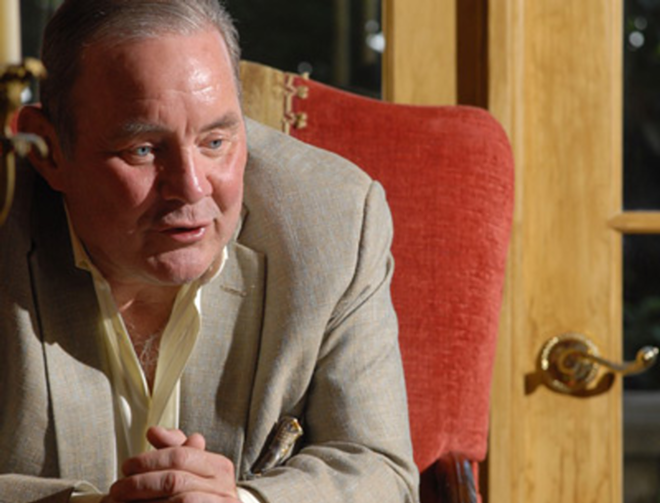
Who? One of Tampa's biggest philanthropists and ardent urban redevelopers, Don Wallace doesn't fit the mold: he's a soft-spoken country boy who made his fortune in selling recreational vehicles. The Lazy Days RV Supercenter on I-4, which he sold years ago, stands as testimony to his business acumen; his palatial mansion on Bayshore Boulevard is a tribute to his wealth.
Sphere of influence: Wallace, 58, with two children under 9 years old, remains involved in lots of different businesses (including a local steel plant) and charities, but he's best known for his city-building efforts in trying to land the Olympics, rebuild the Central Park Village housing project (both efforts failed) and The Heights, a 50-block renovation of Tampa Heights under way now.
How he makes a difference: Money — and his network of friends who comprise Tampa's unofficial successors to 20th-century leaders such as the Culbreaths, Lykes and Shimbergs.
CL: It's nice to be sitting here in your home; it's become a landmark on Bayshore.
Wallace: We're fixin' to move. We're building a new house in Thonotosassa, on the lake out there, moving back to the country. I grew up on a farm, and I just think it's good for kids to be raised in that environment.
You've done a lot of things in your life. What are you passionate about right now?
As far as our city is concerned, I got involved in trying to renew or rebuild the urban core of our city, which I'm enjoying very much. It's new for me. I think it's tremendously important, also.
Why is that?
Cities rot from their core outward. At one time, right around downtown, the area around Stetson or the area where Central Park was located, those were thriving areas, the places in our city where people lived. But what happens as those areas begin to age is people have to go farther out and farther out to have a place to live. Those areas that are close to a core of a city just begin to go downhill. There's not enough tax dollars to take care of them because the tax base dies up and shrinks away. So pretty soon, you have nothing but urban sprawl.
We've seen it happen in our city. I don't think people enjoy living in cookie-cutter neighborhoods and having to drive 40 minutes to work, but that's the result of cities that decay from the inside out.
Do you consider yourself a particularly political person?
No. I'm not political, and I don't really have a desire to be involved in politics. I certainly like to see good government, because it has a tremendous effect on our lives. But I don't think government in and of itself can solve all of our problems.
How do you get people excited about your ideas, besides the ability to give a lot of money?
We have a group of people in Tampa — at times I wish it was larger — that if they're working on something it's going to be good, so I'm willing to work on it and invest my time in it. ... I wouldn't want to name them.
Is that how Civitas [a plan to replace Central Park Village with a mixed-income urban neighborhood of homes, jobsites and offices] came together?
That was a big part of it. What got me interested in Civitas was not having the Olympics here in Tampa [plans for which originally envisioned the housing projects becoming the Olympics Village housing for athletes], but it was a way to make it possible to do away with Central Park Village. It just seemed unbelievable to me that within a mile of our downtown we had 400-and-some families living in the conditions that those folks were living in. They were good people, and a lot of them were just trying to get by. It's not fair to call those people drug dealers, because that ain't true. You take the time to get to know some of those folks, and you find out they are really good people. They don't want their kids to live like that.
County commissioners voted down the plan. Were we not mature enough politically to make it happen?
There were a lot of different items involved in that, a lot of moving pieces. Politics had a lot to do with it. That was kind of my first introduction to that, and I kind of got an awakening — here's something that is so worth doing, and we can't agree to do it because somebody's mad at somebody else or something happened 10 years ago.
Does that typify Tampa?
It's frustrated me at times. It's probably that way anywhere. What makes us notice it is Tampa is really a small town. I don't feel like we live in this big city. You go out to eat, and there will be a half a dozen people in there that you know.
Maybe part of it is the fact that we have so many people who didn't grow up here. We're not this great big city where everybody gets lost in the shuffle.
Is there a lesson in your life from which Tampa Bay can benefit?
Patience. Patience. The right thing to do in any business is not very complicated. Thirty years ago, when I started in the RV business, I had no idea. I just knew that these are the things that you ought to do, and if you could do them, and if you could get all the people around you to do them, your customers are going to like you. That's not real complicated. The problem is sticking it out.















